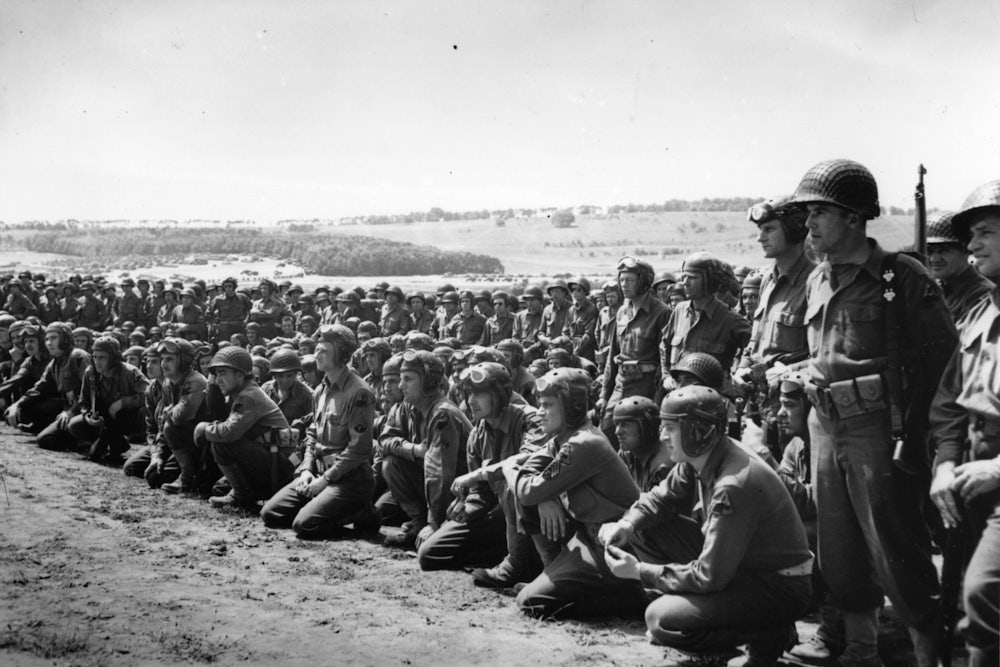I have just returned from a visit to the American-held sector of the Normandy coast, a week after I saw it captured. Now in London, I admire the cool courage of the English civilians, once more subjected to front-line shelling by pilotless missiles producing half their eerie dread by their mystery. One thing is certain. The nation that went through “the Battle of Britain” is not going to lose its nerve now because of this considerable, though lesser, weapon, when the victory is felt to be within grasp. Yet the over-all situation is one that makes it difficult to say which is the battlefront: southern England, where the blazing new missiles are falling, the waters off Normandy, where a German raider dropped a stick of bombs near my ship, or the green French hedgerows.
The most extraordinary first impression on returning to the invasion beachhead which I last saw on D-Day is the way all the forces of man’s miraculous ingenuity in construction have succeeded his equal ingenuity in destruction. One week previous, we were pounding, smashing and churning the sand along the shore with bombs from the air and shells from the sea. Now the new beachheads are among the world’s busiest. A week ago vacant-eyed French houses, blasted with shells, looked out upon a solitary ocean. Now they see ships of every variety coming and going, unloading along the coast. I surveyed only the American sector of the beach front, the most northerly and the nearest to Cherbourg, The elaborate German cement fortifications, now empty and under the curious glance of any chance passing soldier, still show on their walls blonde Nordic pin-up girls. The massiveness of these walls reveals the heroic nature of the Allied accomplishment, a feat to make every American proud, and civilians like me humble.
When I was in Normandy, Cherbourg had not yet been sealed off. Nevertheless, the moment I arrived I was told the town was doomed, and supreme confidence was displayed, contrasting sharply with the still cautious attitude of the press at home. There was little German response to the steadily increasing American artillery bombardment, and our soldiers had the enormous comfort of knowing beyond doubt that the airplanes overhead were their own.
The whole story is told in a few vivid contrasts. Thus roads that were still taped in white as a warning of mines, carried polyglot signs: French painted mile- stones in kilometers, sinister German skulls and cross- bones labeled “Minen” and brash American army directions, “Soft shoulders.” There was French wine to be drunk, free—all that a soldier had to do was to risk his life visiting the former German officers’ headquarters in No Man’s Land.
In a verdant pasture, set around with tall, mastlike trees stripped of boughs, there were the bloated carcasses of dead cows. In the next field dead horses lay on their backs, their legs pointing straight up, like those in a humorous cartoon. Guns were crashing all around. On the grass I saw a familiar crumpled wrapper—from a package of Wrigley’s chewing-gum.
Big American trucks had splashed ashore from open-jawed landing craft over the sand dunes. They still bore their ignominious stencils from earlier British service: “Danger! Left-hand drive!” Now they are back in a country where people drive to the right.
It is too early for me to say what is the reaction of the French peasants, which seems to be mixed. It is possible that only German sympathizers had been permitted to remain in this area. I passed one sullen family of father, mother and daughter, pushing back toward the coast, carrying their scanty possessions away from the region of artillery fire. They gave our jeep black looks as we passed. Yet at another point a chorus of childish voices was raised in happy cheers, and elsewhere children gave us yells of greeting while their smiling parents waved.
I saw a platoon of German prisoners being marched to the stockade by a strutting Yank sergeant with a tommy-gun and two GI’s. The prisoners taken have German officers, but many of the common soldiers are from the conquered peoples. It would be wrong to minimize the stiff and bloody resistance they are putting up. One American battalion commander at the front told me that only 40 percent of his original troops are still effective. The Americans are too reckless and expose themselves too much, just as their fathers did in the early battles of the last war. The enemy resistance, however, is merely competent, not a last-ditch affair. Although it is an isolated front, an atmosphere of anxiety pervades the whole enemy force,
Seeking to counter this, the German propaganda is making extravagant claims of the effects of the new “secret weapon.” I reached London just as this new missile went into use, and there is no doubt of its nerve-jangling effect. The authorities are making every effort to find a quick solution. It’s calming, as I write this, to look across a placid street at a cheap restaurant and see a stolid Cockney cabman and self-sufficient, ruddy-faced Englishwomen of the lower classes, having a spot of tea. No, they don’t panic. It’s a bore of course; doubtless they are all talking about it in there. But if Jerry thinks it will unloosen the strangling grip that is tightening around his windpipe, he just doesn’t know the breed.
